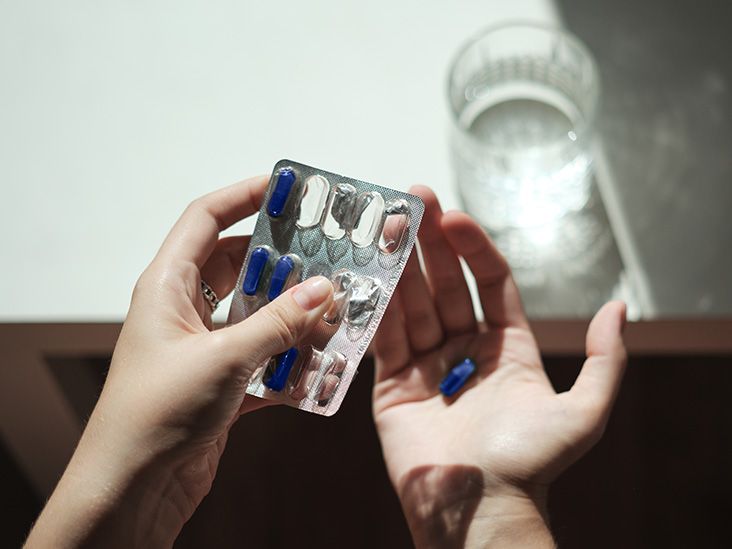Several prescription migraine treatments are stronger and potentially more effective than over-the-counter (OTC) ones. Since many medications work differently, the notion of the strongest migraine medication is a misnomer. Instead, there are a variety of options.
Migraine medications fall into two categories: drugs that help prevent or reduce the frequency of migraine episodes and drugs that manage symptoms once they appear.
Prescription medications tend to be stronger, and many work to help prevent migraine episodes. Still, many OTC medications may work well, particularly for people with infrequent migraine episodes.
People needing help should talk with a headache specialist or a neurologist specializing in migraine to determine which medication is likely to be most effective in their situation.
Read on to learn more about the strongest medicines available for migraine, specifically ones that require a prescription from a doctor.

Triptans are medications that bind to serotonin receptors
Examples of triptans include:
- sumatriptan
- naratriptan
- zolmitriptan
- rizatriptan
- almotriptan
- eletriptan
Triptans do not help prevent migraine episodes. Instead, they reduce pain once an episode occurs. However, doctors sometimes prescribe certain triptans on an off-label basis for the prevention of migraine episodes. These include:
- frovatriptan
- naratriptan
- zolmitriptan
Triptans only work if a person takes them once the pain begins, not during an aura phase. They may cause dizziness, nausea, vomiting, flushing, or neck pain. Around 1% of people who take the medication may experience cardiovascular events such as stroke, heart attack, and arrhythmia.
Ergotamine tartrate is a combination of ergotamine drugs and caffeine. It can help treat migraine episodes and some other headaches that last longer than
Doctors may prescribe ergotamines to both treat and help prevent migraine episodes.
Ergotamines tend to cause more side effects than many other drugs. Side effects include:
- nausea
- vomiting
- muscle cramps and pain
- decreased blood supply, especially at high doses
These drugs are not generally safe for people with a history of cardiovascular disease.
Gepants are the
When a migraine episode begins, the body releases calcitonin gene-related peptides into the nerves. Gepants bind to the blood vessels to reduce the effect of the peptides. They help prevent the blood vessels from expanding, which is key in causing migraine episodes. Unlike some other drugs, they do not constrict the blood vessels.
Certain other drugs can cause a headache from overuse, but there is no evidence that gepants do this. Still, they can cause dizziness, dry mouth, nausea, and fatigue.
Researchers are developing many gepants, but the three currently available are:
- ubrogepant
- atogepant
- rimegepant
Lasmiditan is a
Lasmiditan produces fewer cardiovascular side effects than triptans and may be safer and more tolerable. Dizziness, nausea, and fatigue are the most common side effects. Side effects tend to increase with higher doses.
Zavegepant is a
Doctors may prescribe it to treat migraine episodes with aura in adults. It works best when a person takes it at the earliest signs of a migraine episode occurring.
The most common side effects include pain or discomfort in the nose, nausea, and vomiting. Very rarely, a person can have a hypersensitivity reaction or develop facial swelling.
Most official guidelines
Hospital emergency rooms may administer them on a short-term basis. However, people considering or currently using opioids should ask a doctor about more effective and safer treatments.
Opioids do not prevent migraine episodes, and long-term use of them may even increase chronic pain.
Migraine medications have historically focused on treating migraine episodes. For example, OTC medications such as nonsteroidal anti-inflammatory drugs may ease pain. Acetaminophen may also help.
Some prescription drugs doctors may
- Antinausea or antiemetic drugs: One of the most effective options for migraine episodes is metoclopramide.
- Beta-blockers: Some, but not all, beta-blockers can help with migraine episodes. They include propranolol, timolol, metoprolol, atenolol, nadolol, and bisoprolol. These drugs may also help with anxiety and some arrhythmias.
- Antiseizure drugs: Originally developed to treat seizures, the antiseizure drugs topiramate and valproate may help ease migraine symptoms and prevent migraine episodes.
- Calcium channel blockers: Although doctors do not fully understand how or why they work, some calcium channel blockers, such as verapamil, may work off-label to treat migraine episodes.
- Antidepressants: Antidepressants may help with the psychological challenges of living with migraine. They may also reduce the frequency and severity of migraine symptoms by acting on the brain’s serotonin system.
Learn more about migraine medications.
Migraine can be painful and may affect a person’s ability to function. Prevention can greatly improve health and well-being. There is no single strongest migraine medication. Instead, the right medication depends on a person’s symptoms, age, overall health, and which ones they have tried in the past.
People who experience migraine episodes should discuss treatment options with a doctor. It is important to talk about medical history and treatment goals.


